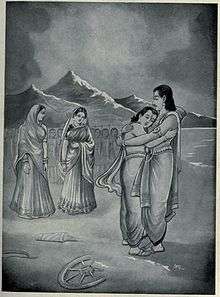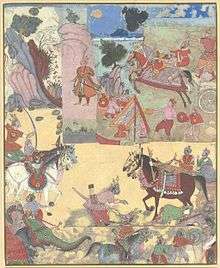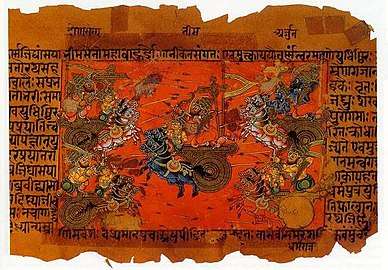Babruvahana
Babruvahana (also known as Babhruvahana or Babhnu Vahana) is a character in Veda Vyasa's epic, the Mahabharata. He is one of the sons of Arjuna, a Pandava, begotten through Chitrangada, the princess of Manipur during the period of his (Arjuna's) exile at Manipura. Arjuna leaves Chitrangada due to a treacherous plot by Arjuna's wife Uloopi from the Naga Clan and Uloopi was envious of Arjuna's marriage to Chitrangada. Babruvahana was adopted as the son of his maternal grandfather and reigned at Manipur as his successor. He dwelt there in a palace of great splendour, surrounded with wealth and signs of power. Later he came to know Arjuna was his father, and when he came to see his father, Arjuna did not recognise him and said he was a wanderer.
| Babruvahana | |
|---|---|
| Mahabharata character | |
 Arjuna hugs Babruvahana | |
| In-universe information | |
| Family | Arjuna (father) Chitrāngadā (mother) |
Legend

As per Mahabharata, Manalur was a kingdom in the Southern region of India. It was ruled by a king named Chitrasena. He had a daughter named Chitrangada, whom he named after Madhulika flower. For multiple generations, the dynasty did not have more than one heir. Since Chitrasena did not have any other heir, he trained Chitrangada in warfare and rule. Chitrangada was well-versed in warfare and acquired the skills to protect the people of her land. The account is described in Rabindranath Tagore's play Chitra,[1] where Tagore depicts Chitrangada as a warrior dressed in male clothes.[2] Arjuna fell in love with her on account of her honesty and courage. They had a son named Babruvahana, whom Chitra reared up after Arjuna left them.[3]
Mahabharata loses mention about Chitra and her kingdom for several chapters. On the other side, the Pandavas went through various ordeals and finally winning the war against the Kauravas. Yudhishthira became the king of Hastinapura. His mind was restless since he always felt bad of killing his own kith and kin during the war. On the advise of sages, he conducted Ashvamedha yagna, where a decorated horse would be sent across the kingdom and wherever it goes unopposed, the land would be acquired by the king who sent it. Arjuna was tasked to take care of the horse. When Arjuna went to Manipura with the wandering sacrificial horse of the Aswamedha, Babruvahana captured the horse, which, by tradition, meant war against the Pandavas. Arjuna tried to persuade Babruvahana to leave the horse as there was no enmity between Manipura and Hastinapura. Babruvanahana agreed with Arjuna but informed him that he wished to kill Arjuna for his Guru Dakshina.[3] Arjuna, reluctant to fight a young boy, left and informed a small troop of his army to convince Babruvahana to give the horse back. Babruvahana defeated the army. He also defeated Bhima and killed Vrishaketu. Knowing this, Arjuna took an oath to kill Babruvahana or immolate himself if he gets defeated. Arjuna fought with Babruvahana and went on upper hand. Arjuna defeated Babruvahana but refused to kill him and went to collect the horse. Babruvahana then used the divine weapon on weaponless Arjuna. This divine weapon would kill any person-even monstrous demons. Soon Arjuna got killed because of curse given to Arjuna by Ganga- Bhishma's mother. Repenting his deed after knowing Arjuna's identity, he was determined to kill himself, but he obtained from his stepmother, the Naga princess Uloopi, a gem called Nagamani which restored Arjuna to life with the help of Krishna. Arjuna, however, repented that he wouldn't be able to live with the remorse due to Vrishtaketu's death, as he was the one who had ordered Vrishtaketu to engage in battle. Krishna, however, promised that he would restore Vrishaketu life. After Vrishtaketu was revived by Krishna, Babruvahana asked Vrishtaketu to forgive him (which he did). Vrishtaketu admired Babruvahana's skill in war. Then, the Pandavas, Uloopi, Chitrangada, Babruvahana, Vrishtaketu and the armies returned to Hastinapura.[3]
Film adaptation
The story of Babruvahana has been made into films in Telugu in 1942 and 1964 and in Kannada in 1977. The 1964 Telugu film was written and directed by Samudrala Raghavacharya and starred N. T. Rama Rao, S. Varalakshmi and Chalam.
It was made into two Hindi movies in consecutive years, Veer Babruvahan in 1951 by Nanabhai Bhatt starring Shashi Kapoor, S. N. Tripathi and Veer Arjun in 1952 starring Mahipal, Nirupa Roy, & Trilok Kapoor.
The Kannada language film, Babruvahana was written and directed by Hunsur Krishnamurthy and starred Rajkumar as Arjuna and Babruvahana in a dual role, B. Saroja Devi as Chitrāngadā, Kanchana as Uloopi and Jayamala as Subhadra.
Bibliography
- Mazumdar, Subash (1988). Who is Who in the Mahabharata. Bharatiya Vidya Bhavan. p. 32.
- Laura Gibbs, Ph.D. Modern Languages MLLL-4993. Indian Epics.
- Dowson's Classical Dictionary of Hindu Mythology
References
- J. E. Luebering (ed.). The 100 Most Influential Writers of All Time. The Rosen Publishing Group, Inc. p. 242. ISBN 9781615300051.
- Tagore, Rabindranath (2015). Chitra - A Play in One Act. Read Books Ltd. p. 1. ISBN 9781473374263.
- Bhanu, Sharada (1997). Myths and Legends from India - Great Women. Chennai: Macmillan India Limited. pp. 7–10. ISBN 0-333-93076-2.

